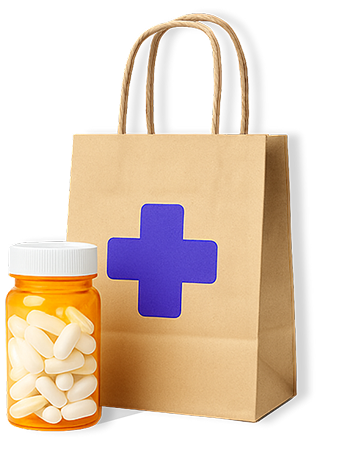Cold Sore (Oral Herpes) Treatment Online
See an online doctor to manage cold sore outbreaks quickly and receive 24/7 personalized treatment.


Available in 50 states. Insurance accepted.
Fast
virtual visits
24/7 care
assistants
Prescriptions
as needed

24/7 Personal Care
Consult with a physician in 15 minutes, refill an Rx or chat with our care assistants.

Affordable & Convenient
See your cost upfront and get treatment for hundreds of different conditions.

Insurance Accepted
We accept most major insurance plans, making healthcare easy and affordable.
See If Delivery Is Available Near You
Delivery Not Available
Enter your ZIP code to check if prescription delivery is available in your area and how soon your meds could arrive.
How to get started
Choose your doctor, start a virtual visit, and have your prescriptions sent to your preferred pharmacy for pickup — all in just a few easy steps.
Choose a doctor
Choose a physician by availability, specialty, ratings, and more.

Start your video visit
Connect with a doctor in minutes on a secure video call.

Get your prescription
Pick up your meds or have them delivered in as little as an hour.

Available in 50 states. Insurance accepted.
One-Time
Physician Visit
One-time visit with a physician for diagnosis, treatment, Rx, labs, referrals, and doctor’s notes.
Accepted Insurances
See why people turn to DrHouse...
As seen in

Cold Sores (Oral Herpes)
Cold sores, also known as oral herpes, are caused by the herpes simplex virus (HSV-1). This common condition leads to the development of painful blisters or ulcers at the site of infection, most frequently around the lips, mouth, and face. While there’s no cure for HSV-1, the virus remains dormant in the body between outbreaks.
Cold sores are highly contagious, especially when the sores are present and open, but the virus can also spread even without visible symptoms through activities like kissing or sharing personal items.
HSV-1 is usually contracted during childhood or early adulthood from non-sexual contact with saliva. Once infected, the virus embeds itself in the nerve tissues where it can periodically reactivate, leading to recurrent outbreaks.
Factors that might trigger these outbreaks include stress, illness, fatigue, exposure to sunlight, and hormonal changes.
Preventive measures to avoid contracting or spreading HSV-1 include avoiding direct contact with cold sores, not sharing items that come into contact with the mouth, and maintaining good hand hygiene.
In case of recurrent outbreaks, certain lifestyle adjustments and medications can help reduce their frequency and severity.
Symptoms
Cold sores, also referred to as oral herpes, are characterized by a distinct progression of symptoms that typically unfold in stages. Here’s a detailed look at each stage:
- Prodrome stage: This initial stage is marked by sensations of tingling, itching, or burning around the lips or affected area. This phase typically lasts between a few hours to a day before the visible appearance of blisters.
- Blister formation: Small, fluid-filled blisters then develop, usually along the edge of the lips. These blisters can also occur around the nostrils or less commonly on the cheeks, gums, or the roof of the mouth. The skin under and around the blisters is often red and swollen.
- Ulcer stage: As the blisters enlarge, they may burst, releasing fluid that contains the virus. Once the blisters have burst, they leave behind one or more open sores or ulcers, which are painful and sensitive.
- Crusting and healing: After the blisters burst, the affected areas will start to dry out and form a crust over the sore. The crust appears brownish or honey-colored. This stage is often accompanied by some itching or irritation. The crust eventually flakes off and the skin heals, but it may leave slight scarring.
- Secondary symptoms: During an outbreak, some individuals may experience secondary symptoms such as fever, body aches, swollen lymph nodes, and general malaise. These symptoms are more common during the first outbreak and can be more pronounced in cases where the immune system is weakened.
Cold sores can recur multiple times throughout an individual’s life. Recurrences are usually triggered by factors like stress, illness, sun exposure, or hormonal changes. Each subsequent outbreak tends to be less severe than the initial one, with symptoms lasting a shorter period.
Cold sore triggers
Cold sores, caused by the herpes simplex virus type 1 (HSV-1), can be triggered by various factors that may compromise the immune system or irritate the affected areas. Common triggers include:
- Stress: Emotional or physical stress can weaken the immune system, making it easier for the virus to reactivate.
- Illness: Colds, flu, or other infections can also suppress the immune system and prompt an outbreak.
- Fatigue: Lack of sleep and general exhaustion can trigger cold sores due to lowered immune response.
- Sunlight exposure: UV rays from sunlight are a well-known trigger, as they can damage the skin and reactivate the virus.
- Weather conditions: Extreme weather, whether hot or cold, can be harsh on the skin and lead to outbreaks.
- Hormonal changes: Fluctuations in hormones, such as those during menstruation, pregnancy, or from hormonal therapy, can trigger cold sores.
- Diet: Certain foods that contain high levels of arginine, such as nuts and chocolate, might exacerbate the condition.
- Dental work: Procedures that stretch or traumatize the mouth area can provoke an episode.
Treatment of oral herpes
Treatment for oral herpes focuses on managing symptoms and reducing the frequency of outbreaks. Antiviral medications are commonly prescribed to treat herpes simplex virus infections. These medications can help to reduce the severity and duration of symptoms during an outbreak and, when taken on a regular basis, may also decrease the frequency of outbreaks.
Cold sore medication
- Antiviral creams: Topical applications such as acyclovir cream can help to speed up the healing of cold sores.
- Oral antiviral medications: Drugs like acyclovir, valacyclovir, and famciclovir are taken orally to help reduce the duration and severity of symptoms. They are most effective when taken at the first sign of an outbreak.
- Pain relievers: Over-the-counter pain relievers like ibuprofen or acetaminophen can help alleviate the pain and fever associated with cold sores.
In addition to medication, keeping the affected area clean and avoiding acidic or salty foods can help manage discomfort.
For those with frequent outbreaks, a healthcare provider might recommend daily antiviral therapy to help prevent recurrences.
Prevention
Preventing the spread and recurrence of oral herpes involves several proactive steps:
- Avoid direct contact: Refrain from kissing or sharing utensils, lip balms, or towels with someone who has an active outbreak.
- Sun protection: Use lip balm with SPF and wear a hat to protect your face from excessive sun exposure, which can trigger cold sores.
- Stress management: Engage in stress-reducing activities like exercise, meditation, or hobbies to keep the immune system strong.
- Healthy lifestyle: Maintain a healthy diet, get adequate sleep, and exercise regularly to boost overall immunity.
- Medication: For those with frequent outbreaks, consider prophylactic antiviral medications prescribed by a healthcare provider.
These measures can significantly reduce the risk of acquiring or spreading the herpes simplex virus, helping manage both the occurrence and severity of outbreaks.
How can DrHouse help?
With the help of telemedicine, DrHouse can assess your symptoms and provide treatment options for oral herpes without you having to leave your home. Our medical professionals can also offer advice on managing outbreaks and preventing recurrences as well as prescribe medication if needed. don’t let cold sores disrupt your life, consult with DrHouse today!
Frequently asked questions (FAQs)
Can cold sores be treated online?
Yes, with the use of telemedicine and virtual consultations, cold sores can be diagnosed and treated online. DrHouse offers convenient and accessible healthcare services for individuals suffering from oral herpes.
Can I get a prescription for cold sores online through DrHouse?
Yes, if a prescription is deemed necessary by our medical professionals after assessing your symptoms and medical history, DrHouse can provide an online prescription for cold sores.
Frequently asked questions




